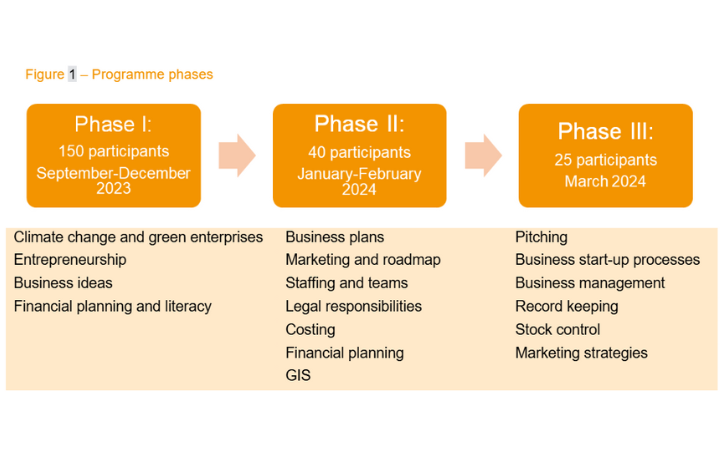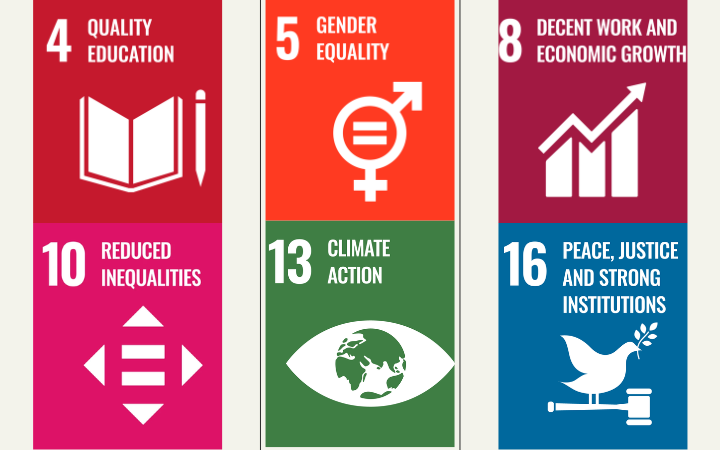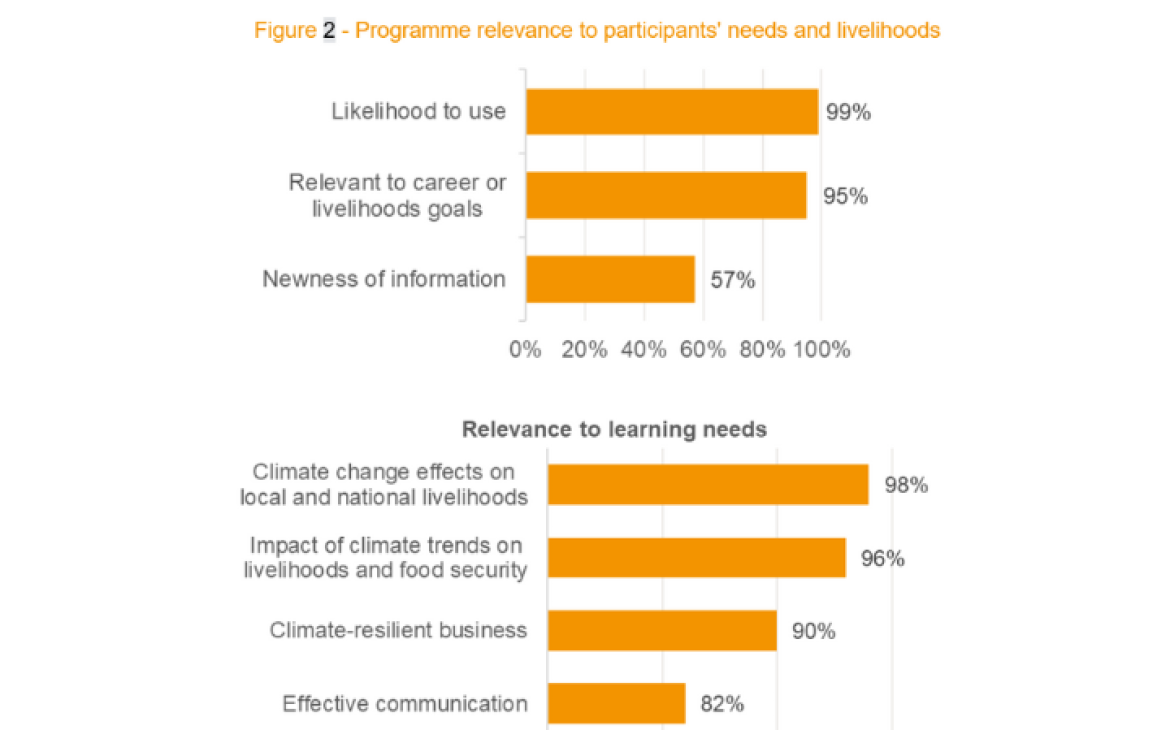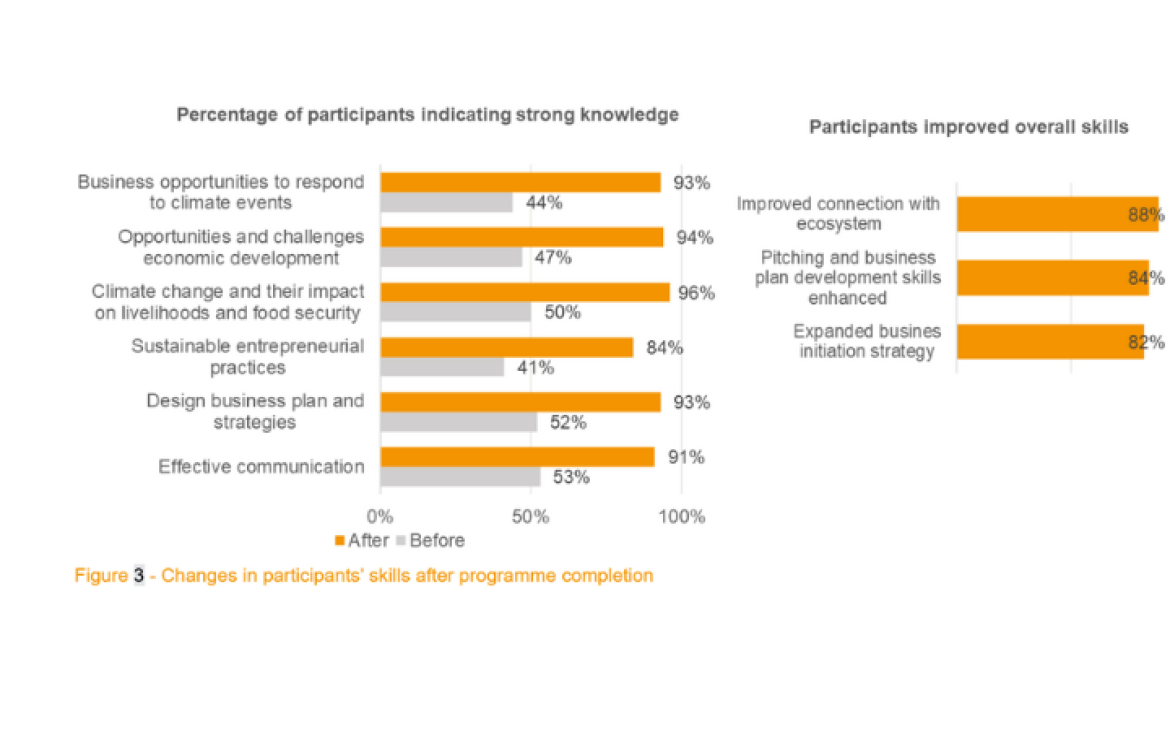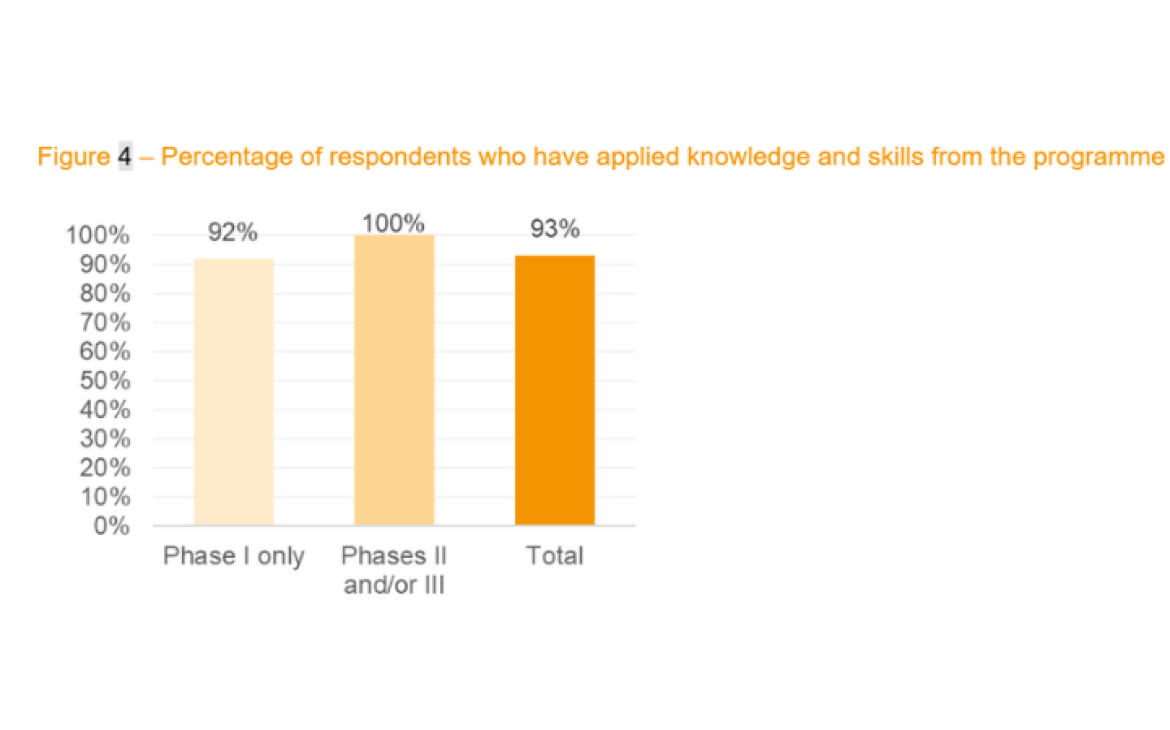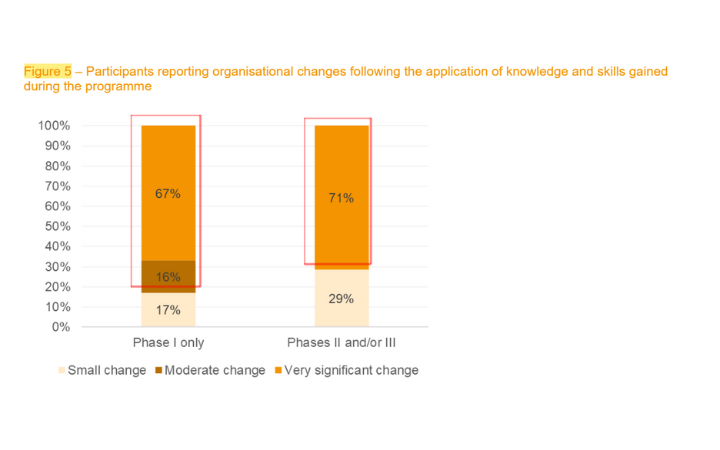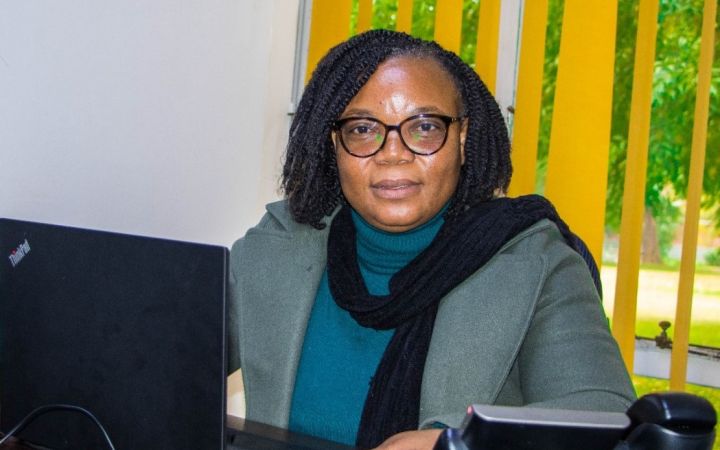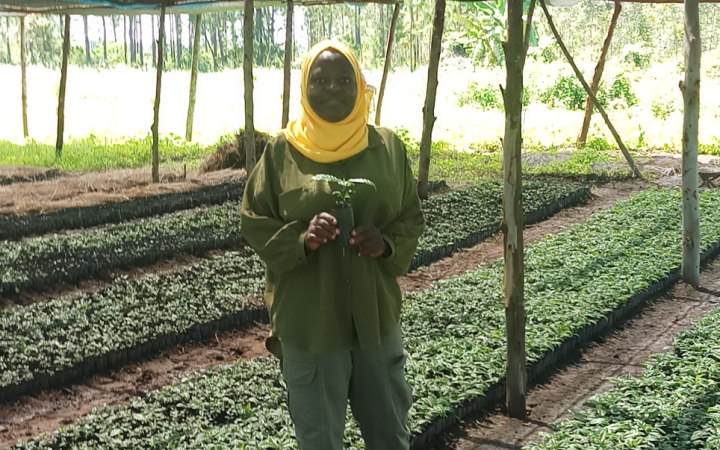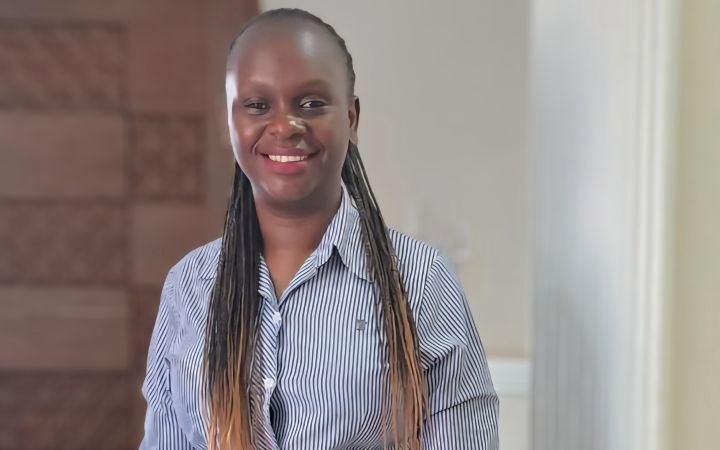Background
Climate change has challenged traditional livelihood strategies, such as agriculture and pastoralism, requiring alternative, resilient livelihood options. To develop capacities that can face these new realities, the UNITAR Division for Prosperity organized the “Developing green livelihoods for women and youth in Africa: Strengthening food security, supporting climate resilient economies” programme. This Impact Story reveals that the programme was useful to participants' needs and that the majority were able to use what they had learned, including participants who started the implementation of their business ideas or project proposals.
With the financial support of the Government and the People of Japan, the programme aimed at equipping youth and women in Africa with essential skills and strategies to mitigate and adapt to the challenges posed by climate change, to foster a sustainable future. The programme received over 1,000 applications and accepted 150 participants from Tanzania, Zambia, and Zimbabwe (50 participants per country). Of these, 72 per cent were women.
The programme was delivered in English between September 2023 and March 2024. It was implemented in three phases, as described in Figure 1. While all three phases included an online component, an in-person workshop was organized in Harare, Zimbabwe, at the end of the second phase and in Tokyo and Hiroshima, Japan, for participants from the third phase. Participants who successfully completed the first phase participated in the subsequent phase. From these, 25 participants were selected based on their project proposals to participate in the third phase of the programme.
Programme Results
Overall, the programme was useful to participants’ needs, with 95 per cent of them finding the programme useful to their career and entrepreneurial goals, despite some confirming that the information presented during the programme was not new to them. Moreover, the programme was most relevant to the needs related to understanding the effects of climate change on (local and national) livelihoods and food security, and how to respond to these by developing climate-resilient businesses, as illustrated in Figure 2.
By the end of the programme, participants considered that their networks in the green entrepreneurial sector had been strengthened and that their pitching, business development, and expansion strategies had been improved. Changes in participants’ knowledge of the thematic areas covered by the programme are illustrated in Figure 3.
Almost all participants who provided feedback after the training indicated that they intended to use the knowledge and skills from the training, which was confirmed by the impact story survey results. Ninety-three per cent of participants have put into practice the acquired knowledge and skills (Figure 4). All survey respondents who took part in the second and/or third phases of the programme indicated having applied knowledge and skills for both the implementation of their project proposals and in other domains.
I have applied green business ideas by starting up a coffee tree seedlings nursery
Using digital marketing, knowing my customer and segmentation, and preparing a business presentation.
All survey respondents who participated in phases two and three continued working on their project proposals, from which 71 percent (five participants) indicated that they were fully implementing their proposals. The projects relate to areas of integrated farming, waste management and recycling, renewable and clean energy, and tourism. Although participants from the first phase did not receive specialized training to develop self-led projects, 76 per cent indicated having started their own business or project proposal after participating in the programme (13 participants). Their proposals cover the topics of integrated farming, waste management and recycling, agri-food processing, climate tech, and architectural business.
Either in the development of a business or project idea or in other aspects of their professional lives, survey respondents considered that the application of knowledge and skills has led to broader organizational changes (Figure 5). These changes include community members changing agricultural practices, streamlined operations and processes, and implementation of new business ideas or projects.
I see in the community people are adopting the use of a drip irrigation system, and some have also installed solar pumps”
We've transitioned from traditional energy sources to solar power, reducing our reliance on fossil fuels and lowering our carbon footprint.
Factors that facilitated the application of knowledge and skills and observed changes identified by survey respondents were the importance of these skills to participants’ jobs or business ideas, having sufficient knowledge to be applied, and the adaptability of the knowledge and skills to their context. On the contrary, the hindering factors identified by participants were a lack of funds, time availability, and the opportunity to connect with other stakeholders to obtain grants or seed funding for their projects.
To better illustrate how participants have applied the knowledge and skills gained from the programme, the following are three stories from individuals who completed all three phases.
Rudo Makandwa - Entrepreneur
From Idea to Action: Integrating Sustainable Farming Practices
Harare, Zimbabwe. Rudo is an entrepreneur, co-managing a farm close to Harare, Zimbabwe. At the time of joining the programme, she was also working in an NGO focused on HIV prevention. When Rudo joined the UNITAR programme, she had two goals in mind. Personally, she had just acquired her farm, which she intended to run sustainably. Professionally, she was leading economic strengthening efforts at the NGO and was looking for long-term, environmentally friendly solutions for schools and communities. While the NGO is no longer active, Rudo achieved her personal goal of running an organic farm after completing the three phases of the programme.
Although environmental sustainability was always in Rudo’s mind, not everyone on the farm had the same thought:
people thought organic farming wouldn’t work […]. They believed the crops wouldn’t last or sell well. So, we had to start by changing that thinking.
Through the programme, Rudo learned how to build a business plan that integrated crops and small livestock, all while keeping sustainability at the core. She and her team slowly began applying these ideas on the farm-growing crops organically, using solar energy, and ensuring that nothing went to waste.
We want the farm to be like a living organism. Everything that comes out of one part feeds into another.
Rudo worked closely with her team to help them understand the value of organic methods. For instance, they realized that using hand weeding allowed creating jobs for local community members. Moreover, to date, more than one year after the programme finalization, Rudo confesses that she still refers back to the business plan developed for the programme.
The programme also inspired Rudo to think beyond her own land. Before her organization’s project was halted, she helped train two schools in permaculture, teaching students how to grow food without harming the soil, make compost, and reduce waste. Even though the NGO could not continue with the project, she hopes the schools will carry the lessons forward.
One of the biggest takeaways for Rudo was how the programme helped her see green livelihoods as more than just farming.
It’s about how you do everything—how you market, how you use resources, how you think about the environment and the community.
Interacting with participants from other countries was also highlighted by Rudo as one of the most useful elements of the programme.
While funding remains a challenge, since loans from financial institutions are quite expensive, Rudo is committed to growing her farm organically, step by step. She hopes future versions of the programme will include mentorship and alumni network elements, which she thinks can help the continuation of participants' projects.
Amina Yusuf Kashoro - Programme coordinator and climate change activist – Greener Tanzania Livelihood Organization
Pursuing the Business Idea of Establishing a Model Nursery and Disseminating High-Quality, Climate-Resistant Coffee Tree Seedlings
Kagera region, Tanzania. Amina is a programme coordinator at “Greener Tanzania Livelihood Organization”, an NGO based in the Kagera region of Tanzania. The organization coordinates activities related to the environment and climate change, including workshops, awareness-raising campaigns, advocacy, and tree-planting activities. Given the nature of her work, Amina defines herself as an environmentalist and climate change activist. When Amina first came across the UNITAR programme on Facebook, she was curious to know what other people from other countries in Africa were working on. Before starting the UNITAR programme, Amina was already involved in tree planting and community awareness campaigns. Still, she had a dream she hadn’t yet acted on: starting a coffee tree seedling project.
At the time, the idea was just that, an idea that she and her colleagues were hoping to start working on. For Amina, the UNITAR programme was “an eye opener” and helped her understand better how to turn her idea into a real, sustainable business. She learned how to create a business plan, do cost analysis, and most importantly, define what makes a business truly “green”. With this new knowledge, Amina began implementing her coffee tree seedling project (production). For Amina, the knowledge that helped her the most with implementing her project was budgeting and cost analysis. While Amina had previously participated in an Academy for Women’s Entrepreneurship (AWE) before the UNITAR one, what was distinctive this time was the connection of entrepreneurship elements to the green livelihoods concept, which helped her in the development of her idea.
Besides starting her coffee tree project, Amina now runs a nursery that also includes cocoa and avocado seedlings. Amina has also tried to engage women from her community as casual workers in the nursery to the extent possible, but their engagement is still limited, given the small size of her project at this moment.
Despite her progress, Amina faced challenges. While the programme gave her the tools and motivation to pursue her idea, especially the extra inspiration found after her trip to Japan as part of the third phase of the programme, finding seed capital was challenging.
Today, Amina’s green business is developing. She hopes to expand and eventually have a woman as her site manager. For future programme phases, Amina recommends having more follow-up opportunities, like mentorship or alumni networks, which could help participants stay connected and continue learning from each other.
Theresia Stephen - Entrepreneur
Applying Entrepreneurship Skills to Develop an Organic Fertilizer and Waste Project
Dar es Salaam, Tanzania. Theresia Stephen was managing her own healthcare clinic in Dar es Salaam, Tanzania, when her mother forwarded her a link to the Developing Green Livelihoods for Women and Youth in Africa programme. At first glance, the programme's focus felt completely outside her area of expertise, but something about it intrigued her. Curious and open to learning, she decided to apply.
Though she was accepted, at the beginning of the programme, Theresia felt lost.
I had zero knowledge about the topics,
she recalled. Still, she reminded herself not to limit her potential and chose to continue. As the programme progressed, she found herself increasingly interested in environmental issues.
She successfully completed the three programme phases of the programme, where she developed the idea for her current project.
I had to look for a gap in my community, there was a time we had a water shortage, and I realized the potential of using organic waste to improve soil and productivity sustainably.
She is now working on building a business focused on producing organic fertilizer and animal protein using organic waste and black soldier fly larvae.
Today, Theresia balances her healthcare clinic with her new agribusiness, though her energy is increasingly focused on the latter.
It’s something new, and when it’s new, you have to give it your 100 per cent focus.
Yet, the learning on developing business plans and pitching gained during the programme has also proved useful to Theresia for the management of her first business. She credits the programme not only with helping her develop the idea, but providing with knowledge and skills, confidence, and mindset to pursue something beyond her original field.
If I put my time and effort into it, it can have a big and meaningful impact.
Theresia aims to lead an impactful green enterprise, one that not only promotes environmental sustainability and supports the national economy but also empowers women and youth to unlock and harness their full potential.
As one of the selected participants who traveled to Japan for on-site training, Theresia found that one of the most valuable parts of the experience was the exposure to both local and international networking opportunities. Participants were connected with professionals in their fields of interest.
Now, Theresia is actively seeking opportunities to grow her business. She is continuously innovating and refining her range of BSF-based organic fertilizer and sustainable animal protein products, demonstrating a hands-on commitment to quality, sustainability, market responsiveness, and positioning herself at the forefront of agribusiness solutions that support climate-smart agriculture, food security, and circular economy practices. She acknowledges that it is a costly venture that needs commitment and dedication, but believes strongly in its long-term potential.
If it were easy, everyone would have done it, you have to be resilient and patient; these things take time to come into realization.
As part of her efforts to continue growing her venture, Theresia participated in an entrepreneurship programme funded by a bilateral donor that, besides complementing professional and entrepreneurship skills such as financial management and leadership, provided seed funding with which she could start her business proposal last January. She considers this an important factor for moving ahead with the idea she developed during the UNITAR programme.
She also highlighted a key challenge: once the programme ends, participants often feel left on their own.
Do not just leave the participants hanging, otherwise, all the efforts put into training us - the knowledge and the skills - will just end there.
In her view, post-programme support is essential: consistent follow-up, understanding how participants are applying what they have learned, and linking them with relevant sectors, suppliers, or investors.
Her message is clear:
training is only the first step. To truly create sustainable change, programmes must build bridges for participants to apply their learning in the real world. Make sure you follow up on the projects and link participants with their respective sectors… it makes all the difference
Theresia concluded.
Conclusion
Programme participants were overall satisfied with the learning experience and indicated having improved their knowledge and skills. While for a large part of participants, the programme information was not new, they considered it was still relevant to their careers and livelihood goals, especially the topics related to climate change effects on livelihood strategies. Besides the technical knowledge, participants also suggested improvement in their pitching skills and reported having more exposure to other entrepreneurs in the region. Evidence on the application of knowledge and skills was collected by this Impact Story. Most participants got the chance to apply knowledge and skills from the programme, especially those participating in phases II and III. Part of these application areas are related to the continuation of work on their business ideas or project proposals, even for participants from phase I. Furthermore, participants confirmed that the application of knowledge and skills led to broader changes either in their organizations, in their professional lives, or in the total implementation of their business ideas or project proposals. While for some participants these changes were small, at least 70 percent recognized these changes as significant for the ventures. One of the most recurrent challenges in the application of knowledge and skills mentioned by survey respondents and interviewees was access to seed funding to implement their proposals. A common recommendation from participants for future editions was to connect participants with opportunities to obtain seed capital for their projects. Other recommendations suggest including a coaching component in the programme or establishing an alumni network that allows them to continue having networking opportunities after the programme and have more clarity in issuing certificates after successful programme completion.


